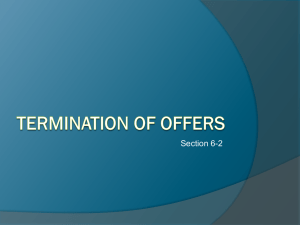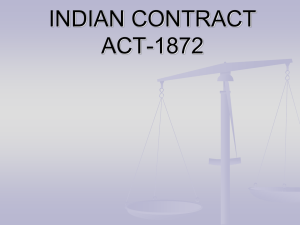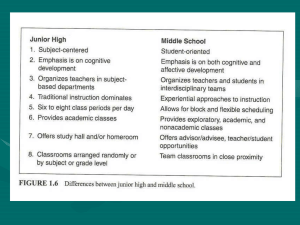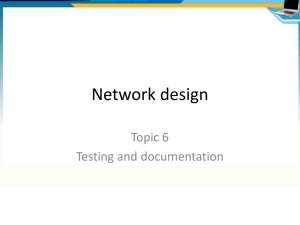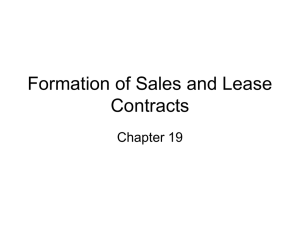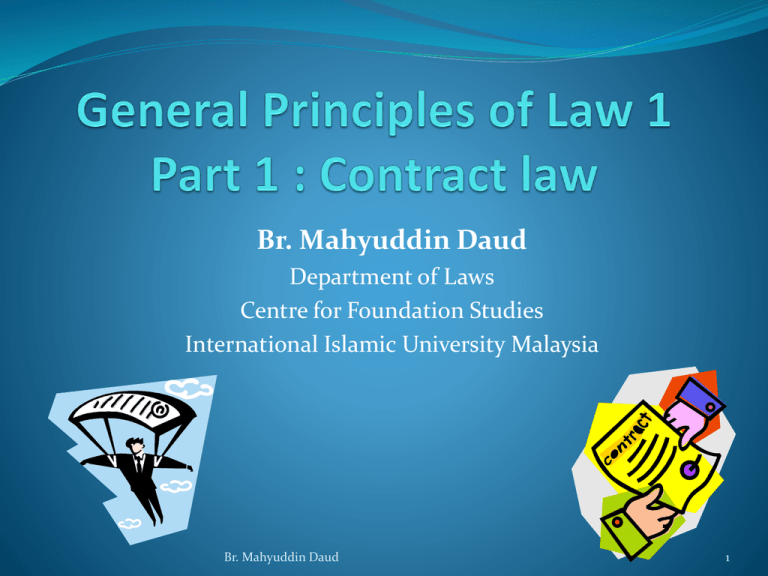
Br. Mahyuddin Daud
Department of Laws
Centre for Foundation Studies
International Islamic University Malaysia
Br. Mahyuddin Daud
1
Why do we need contract law?
Ensure the parties to a contract / agreement keep to
their promises
2. The keeping of promises reinforces the social bonds
of mutual confidence and security amongst the
parties
3. Moral obligation to keep promises
4. It forms part of the principle of fairness as enshrined
in the theory of law
1.
Br. Mahyuddin Daud
2
FORMATION OF CONTRACT
Br. Mahyuddin Daud
3
What is a Contract?
An agreement
Between 2 or more parties
Intention to be bound by such agreement
Consideration is provided
Br. Mahyuddin Daud
4
Other definitions…
John Salmond
A contract is an agreement creating and defining the
obligations between 2 or more parties
Economics: Principles in action. Upper Saddle
River, New Jersey 07458: Pearson Prentice Hall.
2003. pp. 523.
A contract is an agreement between 2 or more parties,
that if it contains the elements of a valid legal
agreement, is enforceable by law
Br. Mahyuddin Daud
5
Differences between
Unilateral & Bilateral Contracts
Unilateral
Only 1 party assumes
obligation, the other
does not promise
anything in return
Br. Mahyuddin Daud
Bilateral
Both parties assume
obligation & exchange
promises
6
Unilateral contract
Ahmad promised to pay Murad RM 1,000 if Murad found
Ahmad’s lost kitten:
Ahmad assumes the obligation to pay if Murad found his lost
kitten
Murad does not promise anything in return
This is a unilateral contract!
E.g. Carlill v. Carbolic Smoke Ball Co. where the Court
upheld that the company made a valid unilateral offer to
the whole world at large
Br. Mahyuddin Daud
7
Bilateral contract
Ahmad promises to pay Murad RM 1,000 and Murad
promises to find Ahmad’s lost kitten.
Both parties promised to do something / assume
obligation
This is a bilateral contract!
Br. Mahyuddin Daud
8
Elements of a valid contract
Offer
Acceptance
Contract
Intention
Consideration
Capacity to
contract
Br. Mahyuddin Daud
9
OFFER
Br. Mahyuddin Daud
10
1. Offer
What does an ‘offer’ means?
An expression of willingness by the offeror to enter
into an agreement with the offeree.
Prof. Treitel:
Offer is an expression of willingness to contract, on
certain terms, made with the intention that it shall
become binding as soon as it is accepted by the person
to whom it is addressed, the offeree.
Br. Mahyuddin Daud
11
OFFEROR
Br. Mahyuddin Daud
OFFER
OFFEREE
12
Termination of an offer
Offer can be terminated by several ways:
1. When the terms of the offer allows it to be open for
certain time, and upon expiry of that time, the offer
will lapse
2. Offer will lapse after a reasonable length of time has
passed
Ramsgate Victoria Hotel v. Montefiore
-A 5 months of time gap lapses the offer to buy shares
because the price of shares could fluctuate quickly
Br. Mahyuddin Daud
13
Cont…
3. If the offeror, makes an offer, with certain
preconditions to be fulfilled, by the offeror before
acceptance, upon failure to fulfill such preconditions,
shall make the offer lapses
Financings Ltd v. Stimson
4. An offer will lapse upon its rejection
Br. Mahyuddin Daud
14
Cont…
5. An offer will lapse once it is being countered
(counter-offer)
6. Death of the offeror & offeree
7. Withdrawal of an offer
Once an offeror withdraws an offer, the offer will be
terminated
However, withdrawal of an offer will take effect
upon its communication to the offeree
Ex: Byrne & Co v. Leon Van Tienhoven
Withdrawal must be communicated to the offeree
Br. Mahyuddin Daud
15
Cont…
Withdrawal of an offer (unilateral contracts)
The legal principle: Once the offeree has started to
perform (Dahlia Ltd’s case) or had partially
performed (Errington v. Errington) on a unilateral
contract, offeror cannot revoke his offer.
But, there is an exception to this principle,
i.e. unilateral offer entered into between an estate agent
& landowner.
Landowner can revoke his offer at any time before
the sale is completed although the agent had made
extensive efforts to find a buyer. (Luxor’s case)
Br. Mahyuddin Daud
16
Ignorance of an offer
Principle: If the offeree knows about the offer, then
he is entitled for the reward
Williams v. Carwardine : D offered $20 to anyone who
provided D with information that lead to the discovery
of a murderer. P provided such information not with
the intention to get the reward, but to help. The court
held that she was entitled to the reward since she was
aware about the offer
Exception: If the offeree knows about the offer, but
forgets, he is deemed to have ignored the offer,
and he is not entitled for the reward
R v. Clarke’
Br. Mahyuddin Daud
17
INVITATION TO TREAT
Br. Mahyuddin Daud
18
Invitation to Treat
Definition: It is an indication of a person’s willingness
to negotiate a contract
It is a contractual process which does not bring any
legal implication, unlike offer. Once an offer is made, it
is subject to acceptance by the other party.
ITT means that the party shows his willingness to
negotiate a contract
But, offer shows willingness of an offeror to enter
into contract
ITT
Offer
Br. Mahyuddin Daud
Acceptanc
e
Contract
19
What would be considered as
ITT?
Advertise
ments
Invitation
to Treat
Display
of Goods
Br. Mahyuddin Daud
Others
20
Display of Goods
Legal principle: Goods which are displayed on shelves
or in the windows of shops are generally regarded as
invitation to treat.
Ex:
1. Fisher v. Bell : display of flick knives only amount to
ITT, therefore, no offer was made.
2. Pharmaceutical Society v. Boots Cash Chemist :
display of medicine on shelves only amounted to ITT.
Br. Mahyuddin Daud
21
Advertisements
1.
Unilateral contracts : advertisements will be treated
as an offer due to minimum possibility of negotiation
to happen (ex: Carlill’s case)
2. Bilateral contracts : advertisements will be treated as
ITT due to higher possibility of negotiation to
happen
Br. Mahyuddin Daud
22
Others
Gibson v. Manchester City Council – the letter
informing of the price was only one step in the
negotiations, therefore it was not an offer, but only an
ITT
Harvey v. Facey – The Privy Council held that
indication of lowest acceptable price does not
constitute an offer to sell. Rather, it is considered an
invitation to treat (i.e., to enter into negotiations).
Br. Mahyuddin Daud
23
Cont…
Auction – the advertisement of an auction is a mere
declaration of intention and not offer
The auctioneer’s request for bids is an ITT, and each bid
is an offer
Tender - request for tenders is regarded as ITT
Br. Mahyuddin Daud
24
ACCEPTANCE
Br. Mahyuddin Daud
25
Definitions…
Acceptance is an unconditional agreement to all the
terms of that offer.
It also signifies a final and unqualified expression of
assent to the terms of an offer
Br. Mahyuddin Daud
26
Methods of Acceptance
Verbal / Express Acceptance
2. Conduct / Implied Acceptance
3. Silence
1.
Br. Mahyuddin Daud
27
1.Verbal / Express acceptance
The most common method of acceptance
It is where the offeree accepts the offer
straightforwardly / directly.
The offeree may use any technology to communicate
his acceptance, i.e. telephone, fax, letters, e-mail as
long as the acceptance is in a direct form.
Br. Mahyuddin Daud
28
2. Acceptance by conduct
The offeree signifies his acceptance by doing
something that conform to the offeror’s offer
Ex: Brogden v Metropolitan Rail Co where the act of
Brogden supplying the new order of coal amounted to
acceptance of the railway company’s offer by conduct
Br. Mahyuddin Daud
29
3. Acceptance by silence
General rule: Silence does not amount to acceptance
unless it is otherwise agreed by both parties.
Felthouse v. Bindley : (the sale of horse) the act of
nephew not responding to the uncle’s offer letter was
an act of silence. The court was uncertain whether he
was accepting the uncle’s offer or not.
Br. Mahyuddin Daud
30
Communication
Acceptance will only take effect upon its
communicated to the offeror.
If acceptance is not communicated, then there will be
no contract
Br. Mahyuddin Daud
31
Exceptions to the
communication rule…
In these situations, acceptance need not to be
communicated:
1. When the terms of the offer states that
acceptance need not to be communicated to the
offeror
Ex: Carlill v. Carbolic where the advertisement
(offer) stated that the offeree only need to perform
the required act (consumption of the medicine).
Br. Mahyuddin Daud
32
Cont…
2. Offeror fails to take notify of the acceptance by
offeree i.e. (conduct of the offeror)
3. Postal rule (Ordinary post)
Principle: If acceptance is made by post, acceptance
will take effect as soon as the letter is posted,
not when it is communicated. (automatic
acceptance)
This rule was laid down in the case of Adams v.
Lindsell (sale of sheep fleeces)
Br. Mahyuddin Daud
33
Exceptions to the postal rule
The postal rule (automatic acceptance) will not apply in
these circumstances:
1. The terms of an offer requires acceptance to be
communicated
2. Instantaneous communication
Communication will take effect immediately
See Entores’s case
Br. Mahyuddin Daud
34
Entores v. Miles Far East Corp
Facts: P = London co. D = US (based in Amsterdam).
They contracted through telex. Later, P alleged that D
breached their contract. The procedural rule was that
if they wanted to brought the matter in English court,
the contract must be made in England
Issue: Whether the court had the jurisdiction to hear the
matter?
Held: In order to answer this issue, the court need to
decide where was the contract concluded, whether at
London or Amsterdam?
Br. Mahyuddin Daud
35
Amsterdam
Cont…
London
Offer
Offeree
Offeror
Acceptance
Br. Mahyuddin Daud
36
Cont…
Since instantaneous rule applied, the contract was
concluded at London. Therefore, the court has the
jurisdiction to hear the case.
Br. Mahyuddin Daud
37
METHODS TO APPROACH PROBLEMATIC
QUESTIONS
Br. Mahyuddin Daud
38
Br. Mahyuddin Daud
39




